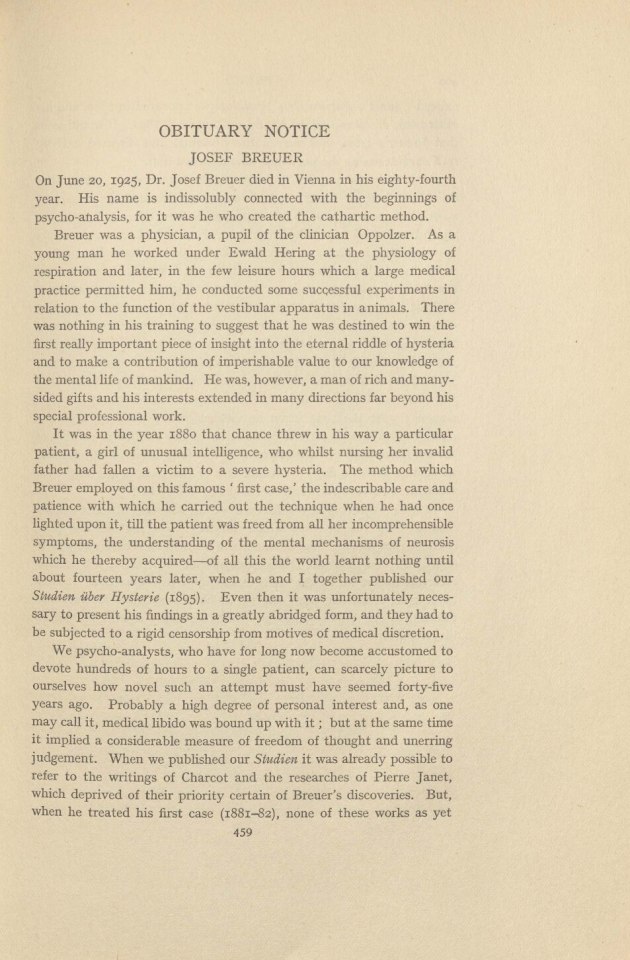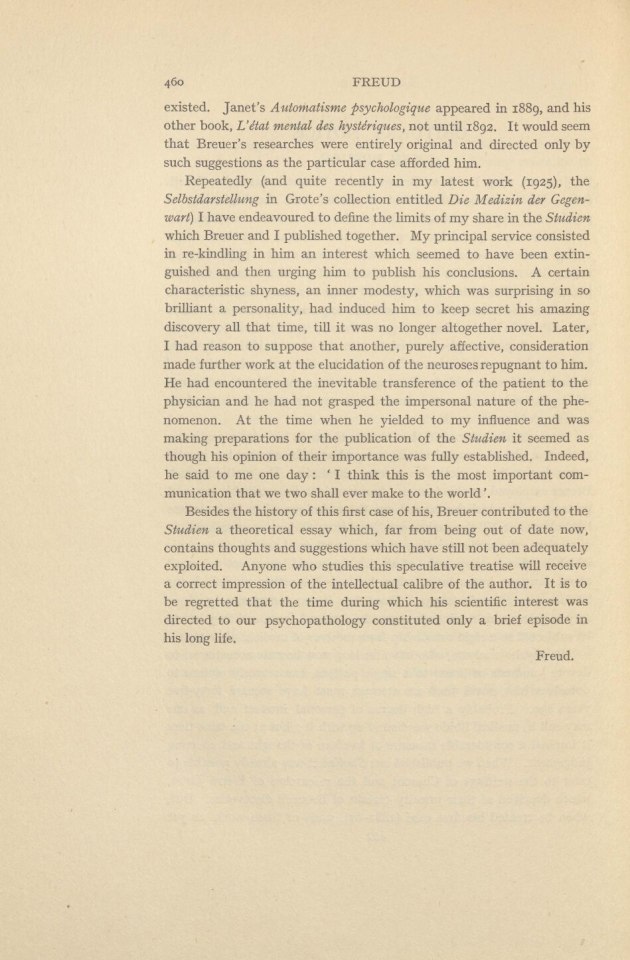S.
OBITUARY NOTICE
JOSEF BREUER
On June 20, 1925, Dr. Josef Breuer died in Vienna in his eighty-fourth
year. His name is indissolubly connected with the beginnings of
psycho-ahalysis, for it was he who created the cathartic method.Breuer was a physician, a pupil of the clinician Oppolzer. Asa
young man he worked under Ewald Hering at the physiology of
respiration and later, in the few leisure hours which a large medical
practice permitted him, he conducted some sucgessful experiments in
relation to the function of the vestibular apparatus in animals. There
was nothing in his training to suggest that he was destined to win the
first really important piece of insight into the eternal riddle of hysteria
and to make a contribution of imperishable value to our knowledge of
the mental life of mankind. He was, however, a man of rich and many-
sided gifts and his interests extended in many directions far beyond his
special professional work.It was in the year 1880 that chance threw in his way a particular
patient, a girl of unusual intelligence, who whilst nursing her invalid
father had fallen a victim to a severe hysteria. The method which
Breuer employed on this famous ‘ first case,’ the indescribable care and
patience with which he carried out the technique when he had once
lighted upon it, till the patient was freed from all her incomprehensible
symptoms, the understanding of the mental mechanisms of neurosis
which he thereby acquired—of all this the world learnt nothing until
about fourteen years later, when he and I together published our
Studien über Hysterie (1895). Even then it was unfortunately neces-
sary to present his findings in a greatly abridged form, and they had to
be subjected to a rigid censorship from motives of medical discretion.We psycho-analysts, who have for long now become accustomed to
devote hundreds of hours to a single patient, can scarcely picture to
ourselves how novel such an attempt must have seemed forty-five
years ago. Probably a high degree of personal interest and, as one
may call it, medical libido was bound up with it; but at the same time
it implied a considerable measure of freedom of thought and unerring
Judgement. When we published our Studien it was already possible to
refer to the writings of Charcot and the researches of Pierre Janet,
which deprived of their priority certain of Breuer’s discoveries. But,
when he treated his first case (1881-82), none of these works as yet459
S.
460 FREUD
existed. Janet’s Aulomalisme ‚psychologique appeared in 188g, and his
other book, L’etat ‚mental des hysteriques, not until 1892. It would seem
that Breuer’s researches were entirely original and directed only by
such suggestions aS the particular case afforded him.Repeatediy (and quite recently in my latest work (1925), the
Selbstdarstellung in Grote’s collection entitled Die Medizin der Gegen
wart) I have endeavoured to define the limits of my share in the Studien
which Breuer and I published together. My principal service consisted
in re-kindling in him an interest wbich seemed to have been extin-
guished and then urging him to publish his conclusions. A certain
characteristic shyness, an inner modesty, which was surprising in so
brilliant a personality, had induced him to keep secret his amazing
discovery all that time, till it was no longer altogether novel. Later,
I had reason to suppose that another, purely affective, consideration
‚made further work at the elucidation of the neurosesrepugnant to him.
He had encountered the inevitable transference of the patient to the
physician and he had not grasped the impersonal nature of the phe-
nomenon. At the time when he yielded to my influence and was
making preparations for the publication of the Studien it seemed as
though his opinion of their importance was fully established. Indeed,
he said to me one day: ‘1 think this is the most important com-
munication that we two shall ever make to the world’.Besides the history of this first case of his, Breuer contributed to the
Studien a theoretical essay which, far from being out of date now,
contains thoughts and suggestions w) ich have still not been adequately
exploited. Anyone who studies this speculative treatise will receive
a correct Impression of the intellectual calibre of the author. Itis to
be regretted that the time during which his scientific interest was
directed to our psychopathology constituted only a brief episode in
his long life.Freud.
ijp_vi_1925_4
459
–360


